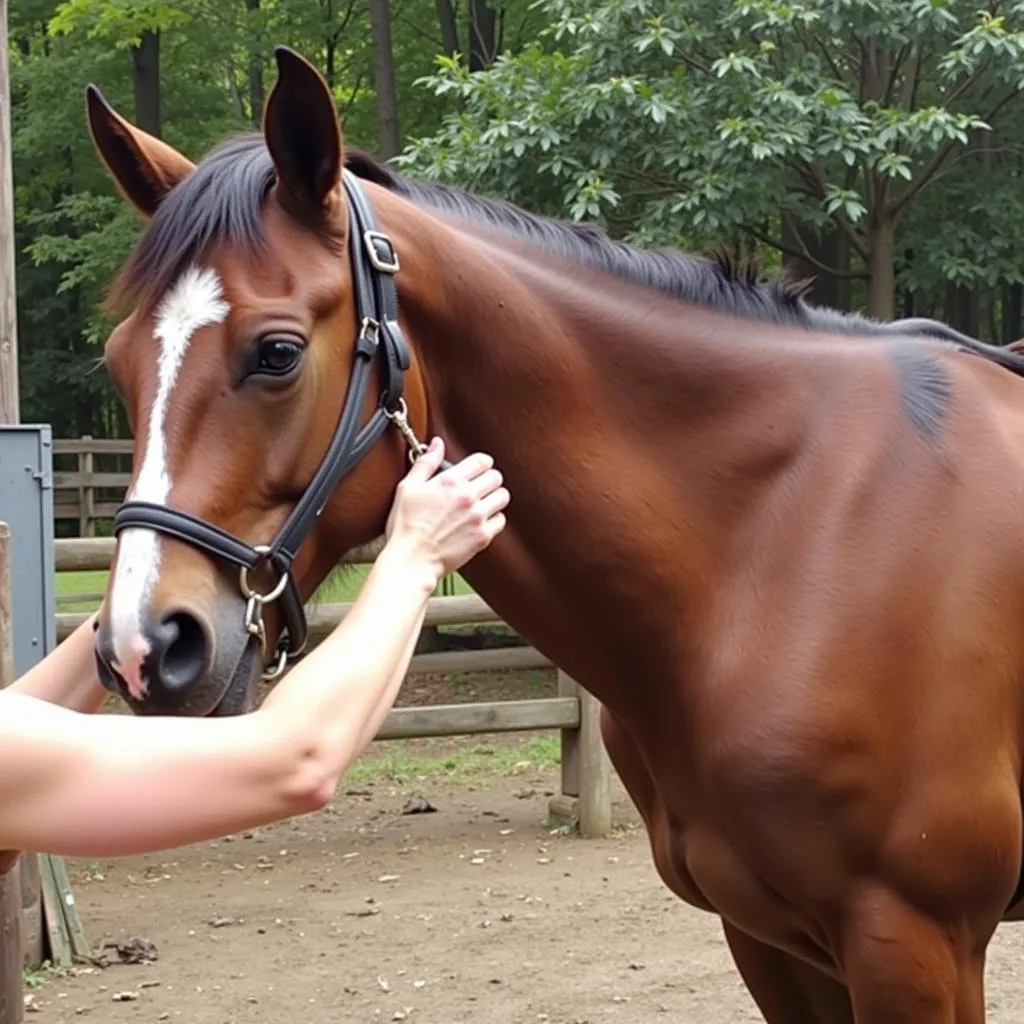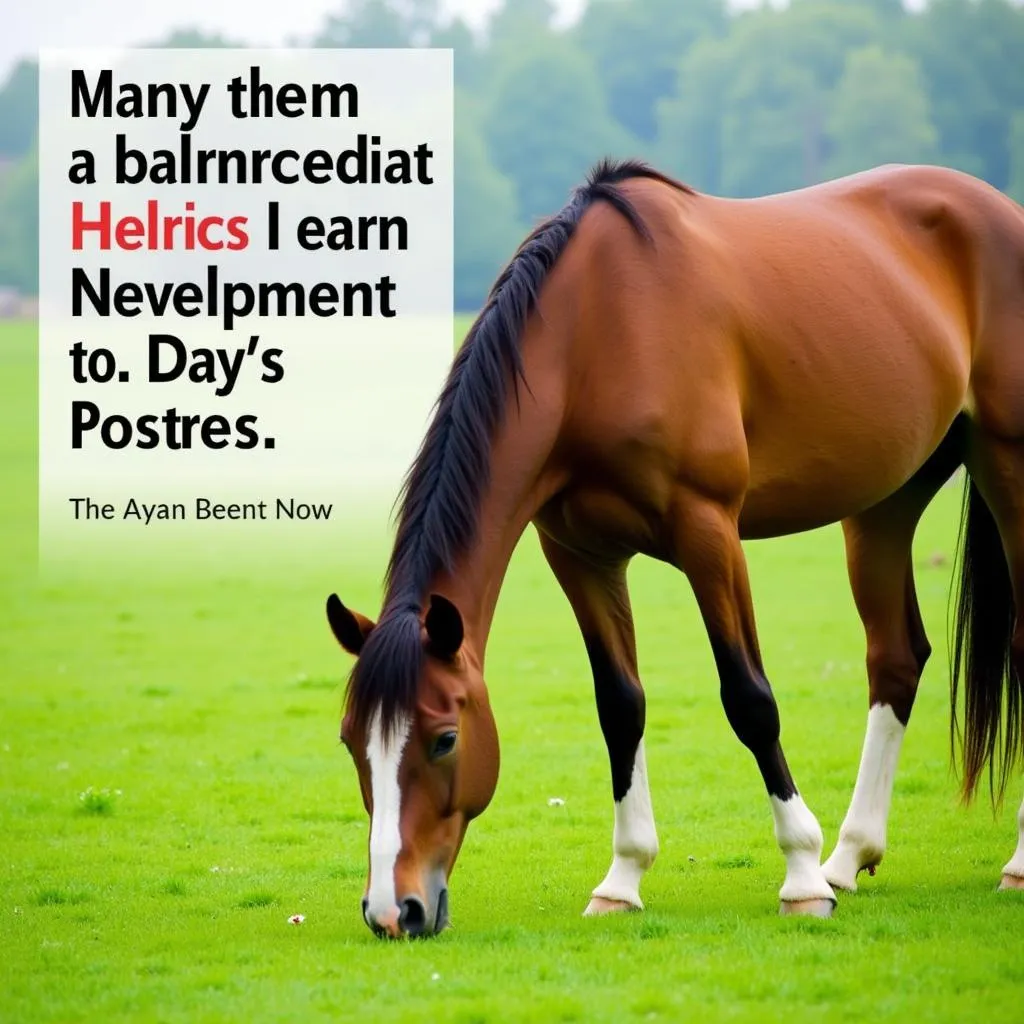Horses are majestic creatures that bring joy and excitement to many lives. Whether you’re a seasoned equestrian or just starting your journey with these incredible animals, it’s crucial to understand the fundamentals of horse care.
No Horsing Around when it comes to your horse’s well-being. Proper care ensures their health, happiness, and a long and fulfilling life. This guide will dive into key aspects of horse care, from basic needs to essential practices that every horse owner should know.
Essential Horse Care: A Comprehensive Guide
Nutrition: The Fuel for a Healthy Horse
Just like humans, horses need a balanced diet for optimal health. They require a specific mix of nutrients, including:
- Forage: Hay and pasture grasses provide essential fiber for digestion and energy.
- Grain: Oats, corn, and other grains are excellent sources of energy and protein, but should be fed in moderation to avoid digestive issues.
- Supplements: Depending on your horse’s specific needs, you might consider adding vitamins, minerals, and other supplements to their diet.
“Remember, a horse’s diet should be tailored to their age, breed, activity level, and individual needs,” says Dr. Emily Carter, a renowned equine veterinarian.
Housing: Providing a Safe and Comfortable Home
Horses are social animals who thrive in a safe and comfortable environment. Here’s what to consider when choosing and managing their housing:
- Stable: A well-ventilated stable provides shelter from the elements and allows for proper grooming and feeding.
- Pasture: Pasture provides ample space for horses to graze and exercise, promoting both physical and mental well-being.
- Fencing: Secure fencing is crucial to prevent escapes and ensure safety for both horses and humans.
“Horses require access to fresh water at all times,” explains Dr. Carter.
Grooming: Keeping Your Horse Clean and Healthy
Regular grooming is essential for maintaining your horse’s health and hygiene. Here’s a simple grooming routine to follow:
- Brushing: Remove dirt, mud, and loose hair with a curry comb, body brush, and dandy brush.
- Hooves: Regularly clean and trim your horse’s hooves to prevent infections and ensure proper gait.
- Mane and Tail: Brush and detangle your horse’s mane and tail, keeping them clean and free of tangles.
Veterinary Care: Ensuring Your Horse’s Health
Just like humans, horses need regular veterinary care to prevent illness and address any health issues. Here are some key aspects of horse healthcare:
- Vaccinations: Protect your horse from common diseases by keeping their vaccination schedule up-to-date.
- Deworming: Regular deworming helps control parasites that can affect your horse’s health.
- Dental Care: Horses’ teeth continuously grow, so regular dental checkups are vital to ensure proper chewing and prevent health problems.
- Farrier: A qualified farrier should trim and shoe your horse’s hooves to prevent lameness and ensure proper hoof health.
Training: Developing a Bond and Building Skills
Training a horse is a rewarding experience that strengthens your bond and teaches them important skills. Here are some basic training tips:
- Patience and Consistency: Horses learn best with patience and consistent training methods.
- Positive Reinforcement: Rewards and positive reinforcement are more effective than punishment.
- Basic Commands: Teach your horse essential commands like “walk,” “halt,” “turn,” and “back up.”
“Training a horse is a journey, not a destination,” says Dr. Carter.
No Horsing Around: FAQs About Horse Care
Q: How much water should my horse drink each day?
A: Horses should have access to fresh water at all times and generally drink 8-10 gallons per day.
Q: How often should I groom my horse?
A: Grooming your horse daily is ideal for maintaining their health and hygiene.
Q: How much exercise does my horse need?
A: Horses need daily exercise to stay healthy and maintain their weight.
Q: What are some common signs of illness in horses?
A: Common signs of illness include loss of appetite, lethargy, fever, coughing, and difficulty breathing.
Q: When should I call a veterinarian?
A: Call your veterinarian immediately if you notice any unusual behavior or signs of illness in your horse.
No Horsing Around: Let’s Get Started
This comprehensive guide provides a foundation for understanding the essential aspects of horse care. Remember, no horsing around when it comes to your horse’s well-being. By following these tips and seeking professional advice when needed, you can provide your horse with a healthy, happy, and fulfilling life.
 Essential Horse Care Guide
Essential Horse Care Guide
 Equine Nutrition
Equine Nutrition
 Horse Training Essentials
Horse Training Essentials
If you need further assistance or have any questions, please don’t hesitate to contact us. Our team of experts is here to help you provide the best possible care for your beloved horse.
Contact us:
Phone: 0772127271
Email: [email protected]
Address: QGM2+WX2, Vị Trung, Vị Thuỷ, Hậu Giang, Việt Nam
We’re available 24/7 to answer your questions and provide guidance.